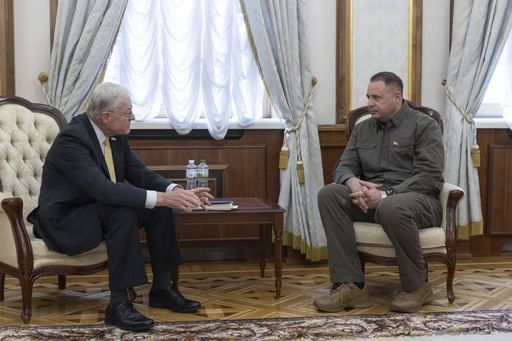
KYIV, Ukraine — Tensions escalated sharply on Wednesday between Ukrainian President Volodymyr Zelenskyy and former U.S. President Donald Trump. Zelenskyy asserted that Trump is ensnared in a Russian-induced “disinformation space,” while Trump branded Zelenskyy “a dictator without elections.” This heated exchange potentially undermines ongoing efforts to resolve the war, which enters its fourth year next week.
In his response to several controversial claims made by Trump the previous day, Zelenskyy expressed a desire for more honesty from Trump’s team. Trump controversially insinuated that Kyiv was responsible for the war, which had drawn international attention and substantial support for Ukraine from the U.S. during the Biden administration. Under Biden, the U.S. provided critical military aid to Ukraine and worked diligently to rally global support against Russian aggression.
The Trump administration appears to be pivoting away from that approach by extending outreach to Russia for a potential peace agreement. Senior officials from both nations met on Tuesday to discuss improving relations, intending to pave the way for a potential meeting between Trump and Russian President Vladimir Putin following years of hostility.
Trump criticized Zelenskyy in a social media post suggesting that Ukraine should proceed with elections, pointing to the current delay because of martial law. He dismissed Zelenskyy as “a modestly successful comedian” who has misled the U.S. into supporting a war that he claims was unwinnable. Trump further commented that Zelenskyy has not been successful in governing and advised him to act quickly or risk losing sovereignty.
Meanwhile, Putin conveyed an interest in meeting Trump. He justified Russia’s full-scale invasion of Ukraine, which commenced on February 24, 2022, claiming it was needed to safeguard civilians in Eastern Ukraine. Moreover, he accused the U.S. of ignoring Russia’s requests about Ukraine’s NATO membership and security assurances. Ukraine and its allies, however, condemned the invasion as an unprovoked act of aggression.
Putin stated during televised comments that he would welcome a meeting with Trump, provided it is adequately prepared to yield positive results. He highlighted Tuesday’s discussions between U.S. and Russian officials in Riyadh as “very positive,” noting that the U.S. representatives approached negotiations without bias or condemnation from the past. The Russian leader emphasized the need for increasing trust between the two countries to effectively address issues, including the ongoing crisis in Ukraine.
German Chancellor Olaf Scholz condemned any notions that undermine Zelenskyy’s democratic legitimacy, stressing that the Ukrainian Constitution and election laws dictate that orderly elections are not feasible during wartime. British Prime Minister Keir Starmer also supported suspending elections during conflicts, citing historical precedence from World War II.
Zelenskyy’s remarks coincided with a meeting with Keith Kellogg, the U.S. special envoy for Ukraine and Russia, as the U.S. pursues diplomatic efforts in the region. Trump appeared dismissive of Ukraine’s concerns regarding its absence from talks with Russian diplomats, suggesting that Zelenskyy could have negotiated to prevent the onset of war. Zelenskyy responded by highlighting the disinformation originating from Russia and called on Kellogg to gauge public opinion on leadership within Ukraine.
Zelenskyy noted that while much international aid flows into Ukraine, a significant portion of that assistance is domestically produced, countering the narrative that the U.S. is solely responsible for Ukraine’s capacity to defend itself. A recent poll indicated that 57% of Ukrainians trust Zelenskyy, a strong figure that supports his claim to political legitimacy.
In Russia, state media seemed to revel in Trump’s criticisms of Zelenskyy, emphasizing a sense of irritation from the former president towards Kyiv’s complaints about exclusion from discussions with Russian officials. Meanwhile, on the battlefield, Ukraine faces relentless offensives from Russian forces, putting pressure on their military, particularly along a complex 1,000-kilometer front line.
U.S. officials have indicated that Ukraine’s aspirations for NATO membership may not be realized even with a potential peace accord. Zelenskyy maintains that any resolution must include solid security commitments from the U.S. to counter future Russian threats.

